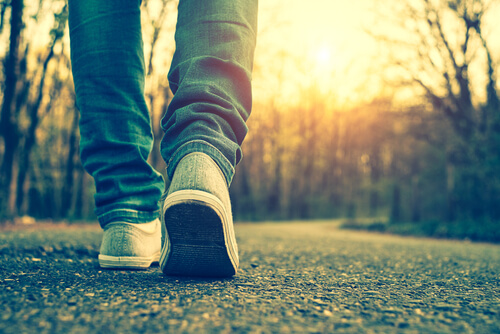7 Benefits of Taking Walks, According to Science

Argentine poet Miguel Cantilo said, “I know that by covering my eyes, I can be very far away without having to walk.” Unfortunately, people who follow this teaching won’t be able to take advantage of the scientific and psychological benefits of taking walks.
Now, after that little touch of humor, we’ll get to the important stuff. There are many benefits of taking walks beyond just enjoying a pleasant activity. There have been various scientific studies on the subject, and the verdict is unanimous: taking walks has great physical and psychological advantages.
Scientific and psychological benefits of taking walks
The first scientific and psychological benefit of taking walks is that it’s a very pleasant activity. A short walk can make you feel better, as it’s a low-intensity, aerobic exercise that can provide you with a moment of peace in the middle of the tension of the day.

Other benefits of taking a good walk include enjoying the beautiful outdoors and improving your physical fitness, which goes hand-in-hand with improving your mental state. One study from the University of Tennessee concluded that women who walked every day had less body fat than women who were more sedentary. This improved their quality of life, as well as decreasing the risk of blood clots.
Further benefits include…
It helps you sleep better
Walking helps the body release serotonin. This is a neurotransmitter derived from the amino acid tryptophan, which increases the production of melatonin. Melatonin regulates the sleep-wake cycle, so therefore, taking walks is ideal for falling asleep quicker and getting better quality sleep.
Also, serotonin is a great stress controller. It’s not a bad idea to take a walk when you feel restless or anxious. In fact, a study at the University of Sao Paulo demonstrated that walking and other forms of aerobic exercise considerably improved the quality of sleep of a group of people with insomnia.
It puts you in a better mood
Do you want to be happier and in a better mood throughout the day? According to California State University, walking not only releases serotonin, but also endorphins. The combination of the two is an ideal mix to make you feel much better, as they’re commonly known as the chemicals of happiness.
“I have learned two ways to tie my shoes. One way is only good for lying down. The other way is good for walking.”
-Robert Heinlein-

It increases life expectancy
The School of Medicine at the University of Michigan states that individuals between age 50 and 60 reduce their chances of dying in the next 8 years by 35% just by walking. I don’t know about you, but this certainly gives me peace of mind!
It reduces and prevents cognitive decline
According to a study at the University of San Francisco, the more you walk, the more slowly your mental capacities decline with age. More specifically, in a study of 5,000 participants aged 65 and older, walking 3 kilometers per day reduced memory loss by 17%.
It prevents the development of Alzheimer’s
Alzheimer’s is a dreaded illness that unfortunately sometimes even preys on young people. Sadly, with the treatments that are currently available, its advancement is unstoppable, but it does seem like they’ve been able to identify some methods of prevention. Among these protective variables is exercise. In a study at the University of Virginia, they found that 70-year-olds who walk at least half a kilometer a day reduce their risk of suffering from this disease by 50%.
It helps you lose or maintain a healthy weight
Whether we like it or not, we live in a world where physical appearance is important. For many people, being in good shape and having a good figure helps them feel more secure in themselves and confident in their possibilities. Not to please other people, but to look and feel better.
Obviously, since it’s an aerobic exercise, taking walks improves your physical figure. Also, because it’s a moderate exercise, it reduces the impact on the body and the risk of injury. That’s why it’s perfect for people with certain conditions, like joint pain.
In addition, it’s a physical activity that can help you burn fat. In fact, the Journal of the American Dietetic Association reports that women who walk more than 5 hours a week show very low levels of body fat.

It reduces stress
We’ve already mentioned that taking walks releases serotonin and endorphins, or the chemicals of happiness. Logically, this is a great way to reduce stress. According to the Journal of Physiological Anthropology, it reduces levels of cortisol, which is a hormone associated with stress and anxiety.
“When I arrived to the country, I couldn’t walk; like I always say, I had the great pleasure of learning how to walk on this land that I have never left.”
-Alicia Moreau de Justo-
Science has confirmed many of the enormous scientific and psychological benefits of taking walks. It takes some willpower to get yourself walking when you’re comfortable and warm under a blanket on the couch at home, especially during the winter months. However, it offers numerous advantages in exchange. If you lack motivation, bringing a pet or chatting with a friend while you walk could be the answer. Don’t forget that with just a little, you can achieve a lot.
This text is provided for informational purposes only and does not replace consultation with a professional. If in doubt, consult your specialist.








